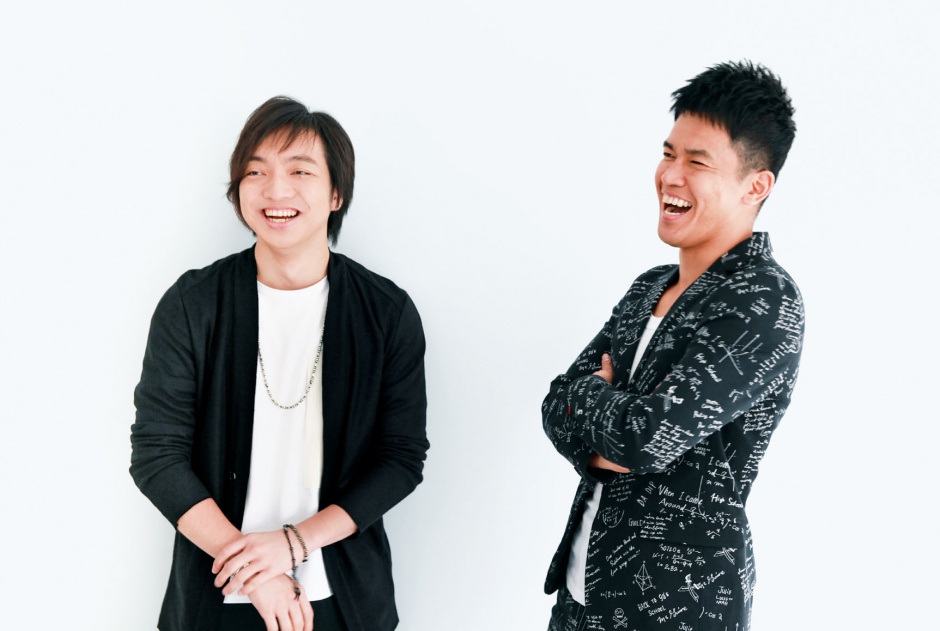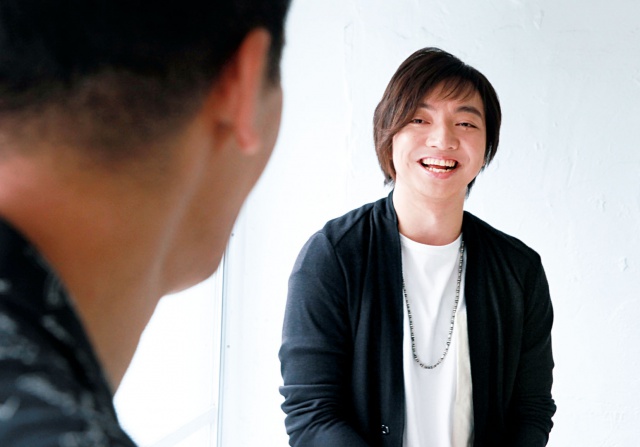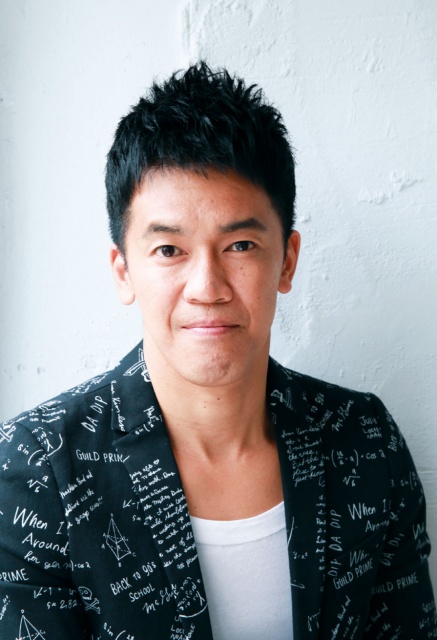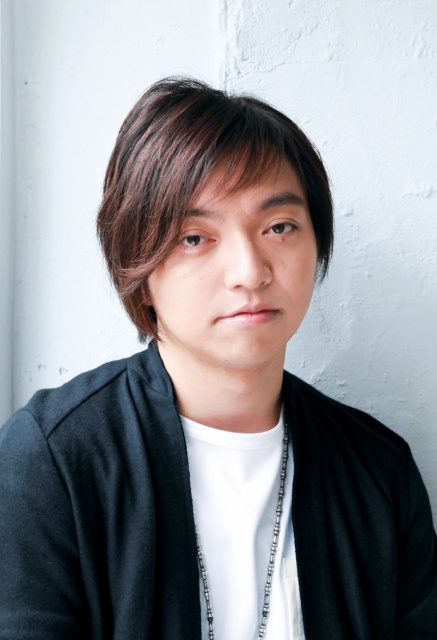vol.
013
JULY
2016
vol.013 / Roundtable
What it Takes to Be an Entertainer
So Takei (king of beasts) × Daichi Miura (musician)

On Becoming a Magician
Takei: I have a lot of respect for entertainers like you, Daichi. All by yourself you cast a spell over your audience. You’re a magician! You do your magic and everyone cries, or feels moved, or has fun. When I see this it makes me realize that that’s something I just don’t have.
Miura: What do you mean you don’t have magic?
Takei: For example, even when I won the decathlon it didn’t put a smile on anybody’s face. The sports ability I’d cultivated just didn’t have that kind of magic. When I realized this, it made me feel envious of those who can use magic: artists, performers, celebrities, and actors. Entertainers play on a field that demands more than just height; they have to have breadth and depth, too, and they make people happy. That’s something I didn’t have. Sure, sports are a kind of entertainment but I was never able to become an entertainer in the world of sports so I decided to become an entertainer who works with sports. That’s how I ended up doing what I do now. What got you started singing and dancing, Daichi?
Miura: For me I suppose discovering Michael Jackson when I was a kid had a lot to do with it. I especially liked his music video for Black or White. All sorts of different ethnicities make an appearance, and as the set changes from country to country Michael joins in with them as they perform ethic dances. I was just a kid when I saw it but it left a huge impression, like, “Wow, Michael’s Michael wherever he goes and whatever he does.” No matter where he went he didn’t get lost in the local color but instead adapted it to create something original; I thought he was so cool, and I was so envious, and I wanted to be like him. That’s what got me started singing and dancing, though of course I knew I’d never be able to climb the same mountain Michael had even if I tried. On the other hand, if there were some other mountain, and if I climbed it my way, then just maybe, just maybe I could approach what Michael did, at least in terms of being an original. That’s the belief that’s kept me going.
Takei: Mt. Daichi, then! You’re right, though. Mt. Everest isn’t the only beautiful mountain out there, and just because a mountain’s tall doesn’t necessarily mean it’s beautiful. How do you think about singing and dancing as ways of expressing yourself?
Miura: For me, I think of dancing as a kind of acting that conveys the world of the song. So if there were a song that would be best conveyed without dancing, I’d leave the dancing out. But the choice not to dance would be, for me, the ultimate dance-like expression.

Takei: That’s really interesting. What you just said reminds me that whenever I try something new I make an effort to avoid becoming somebody reduced to a title. I start by replacing the title with a description of what someone with the title does. I could call myself a singer but if nobody ever heard me sing it wouldn’t mean much, would it? “Singer” is just a word. So for me, a singer is someone who moves people by singing songs. The important thing is the action, the activity. That’s how I like to think of things, anyway.
Miura: As we’ve been talking just now I’m reminded how inspiring it is to hear you talk about the way you look into the essence of things. Why do I sing and dance? Because I’m always trying to get at the essence of these two things, and because ultimately I don’t want to be a singer or a dancer but Daichi Miura — a genre all my own.
Takei: My own title is the King of Beasts, but my occupation is So Takei. Who knew we’d have so much in common? It’s like I was dashing through the long grass toward some unseen goal, gave a roar and looked beside me, and there you were, running too. Like, “Whoa, what’s Daichi doing here?” (Laughs)
Miura: It’d make me crazy happy to run with you!
Takei: And we’d have to do it here in Tokyo. I’ve been to all sorts of cities all over the world but I think Tokyo’s the best. I was born and raised here, but it’s really a magic place where people can have fun and be active around the clock, and turn just about anything into a job. There’s nowhere like it anywhere else in the world.
Miura: I think you’re right. I consider myself someone who’s conscious of creating music that’s from Tokyo. I love the Japanese language, too, and I’m always trying to introduce more Japanese songs to the world.
Takei: Tokyo’s got the finest of everything, and yet you don’t hear a lot of people talk passionately about all that the city has to offer and how much fun it is. I’m not sure there’s any good answer to that, though. It would take enormous effort to get a handle on everything in the city, and there’s no way you could enjoy all of it without a lot of effort and a lot of knowledge. That’s why what I’m trying to say is that it’s a waste to try to enjoy yourself only by, say, competing to see who can go highest in one little world or one narrow field. There’s tremendous breadth and depth, too, and I hope people will look all around Tokyo — 360 degrees around the city — experiment a little bit with different ways to enjoy themselves every day, and grow in the process. And then I really hope people will be ready to have the time of their lives in four years when the Olympics — the finest festival of sports and entertainment in the world — come to Tokyo. I’ve been practicing how to throw a baseball at 140 kilometers an hour, and how to play the piano — trying every day to master some new knowledge or skill.
Miura: I’ll be working hard, too, trying to do something that will entertain even those people who until now have looked at what I was doing and said, “There he goes again, up to something weird.”
Takei: A lot of people who run just say, “Ah, enough already” and throw in the towel halfway through, but I’m pretty sure you’ll keep running. I hate to lose so I’ll keep legging it, too!
Miura: I’m pretty sure you’ll win if we’re racing for speed! (Laughs)
-

So Takei
Known as the “King of Beasts.” Born in 1973 in Tokyo. Former decathlete and Japan national champion. Won a gold medal in the 4 x 100 relay at the World Masters Athletics Championships held in France last autumn. His collection of interviews with top athletes Katsu hito: jusannin no asuritotachi [People Who Win: 13 Athletes] (Bungeishunju) was published on 15 July.
Twitter account @sosotakei. -

Daichi Miura
Musician. Born in 1987 in Okinawa. Debuted in 1997 as the main vocalist for Folder. Served as solo singer for the March 2005 single, “Keep It Goin’ On.” Active as a singer, choreographer, and songwriter, he plays instruments, too. His 15-location, 17-show national tour, Daichi Miura Live Tour 2016, will kick off on 15 September with a performance in the large hall at Suncity Koshigaya Civic Hall.
Editing & Written by Nanae Mizushima
Photography: Katsumi Omori (cover, P2-P4)
Hair & Make-up: Makoto Okuno (So Takei), Yasushi Kato (Daichi Miura)
Styling: Yuya Murata / SMB International. (Daichi Miura)
Special Thanks: VADEL, DOMENICO + SAVIO, winonal, ASICS Japan Corp., IVX JAPAN Co., ltd.
Translation: Office Miyazaki, Inc.



